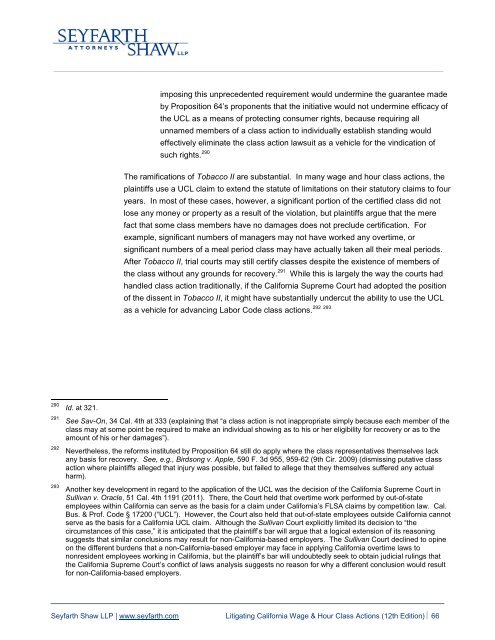Litigating California Wage & Hour and Labor Code Class Actions
Litigating California Wage & Hour and Labor Code Class Actions
Litigating California Wage & Hour and Labor Code Class Actions
You also want an ePaper? Increase the reach of your titles
YUMPU automatically turns print PDFs into web optimized ePapers that Google loves.
imposing this unprecedented requirement would undermine the guarantee made<br />
by Proposition 64’s proponents that the initiative would not undermine efficacy of<br />
the UCL as a means of protecting consumer rights, because requiring all<br />
unnamed members of a class action to individually establish st<strong>and</strong>ing would<br />
effectively eliminate the class action lawsuit as a vehicle for the vindication of<br />
such rights. 290<br />
The ramifications of Tobacco II are substantial. In many wage <strong>and</strong> hour class actions, the<br />
plaintiffs use a UCL claim to extend the statute of limitations on their statutory claims to four<br />
years. In most of these cases, however, a significant portion of the certified class did not<br />
lose any money or property as a result of the violation, but plaintiffs argue that the mere<br />
fact that some class members have no damages does not preclude certification. For<br />
example, significant numbers of managers may not have worked any overtime, or<br />
significant numbers of a meal period class may have actually taken all their meal periods.<br />
After Tobacco II, trial courts may still certify classes despite the existence of members of<br />
the class without any grounds for recovery. 291<br />
While this is largely the way the courts had<br />
h<strong>and</strong>led class action traditionally, if the <strong>California</strong> Supreme Court had adopted the position<br />
of the dissent in Tobacco II, it might have substantially undercut the ability to use the UCL<br />
292 293<br />
as a vehicle for advancing <strong>Labor</strong> <strong>Code</strong> class actions.<br />
290<br />
291<br />
292<br />
293<br />
Id. at 321.<br />
See Sav-On, 34 Cal. 4th at 333 (explaining that “a class action is not inappropriate simply because each member of the<br />
class may at some point be required to make an individual showing as to his or her eligibility for recovery or as to the<br />
amount of his or her damages”).<br />
Nevertheless, the reforms instituted by Proposition 64 still do apply where the class representatives themselves lack<br />
any basis for recovery. See, e.g., Birdsong v. Apple, 590 F. 3d 955, 959-62 (9th Cir. 2009) (dismissing putative class<br />
action where plaintiffs alleged that injury was possible, but failed to allege that they themselves suffered any actual<br />
harm).<br />
Another key development in regard to the application of the UCL was the decision of the <strong>California</strong> Supreme Court in<br />
Sullivan v. Oracle, 51 Cal. 4th 1191 (2011). There, the Court held that overtime work performed by out-of-state<br />
employees within <strong>California</strong> can serve as the basis for a claim under <strong>California</strong>’s FLSA claims by competition law. Cal.<br />
Bus. & Prof. <strong>Code</strong> § 17200 (“UCL”). However, the Court also held that out-of-state employees outside <strong>California</strong> cannot<br />
serve as the basis for a <strong>California</strong> UCL claim. Although the Sullivan Court explicitly limited its decision to “the<br />
circumstances of this case,” it is anticipated that the plaintiff’s bar will argue that a logical extension of its reasoning<br />
suggests that similar conclusions may result for non-<strong>California</strong>-based employers. The Sullivan Court declined to opine<br />
on the different burdens that a non-<strong>California</strong>-based employer may face in applying <strong>California</strong> overtime laws to<br />
nonresident employees working in <strong>California</strong>, but the plaintiff’s bar will undoubtedly seek to obtain judicial rulings that<br />
the <strong>California</strong> Supreme Court’s conflict of laws analysis suggests no reason for why a different conclusion would result<br />
for non-<strong>California</strong>-based employers.<br />
Seyfarth Shaw LLP | www.seyfarth.com <strong>Litigating</strong> <strong>California</strong> <strong>Wage</strong> & <strong>Hour</strong> <strong>Class</strong> <strong>Actions</strong> (12th Edition) 66
















